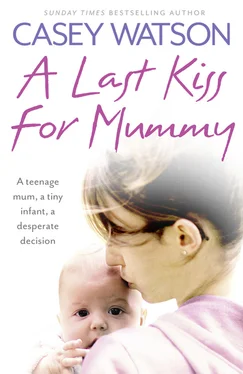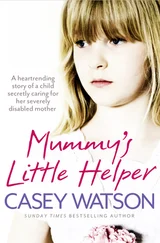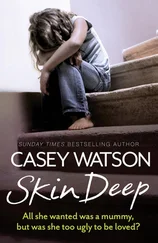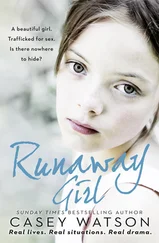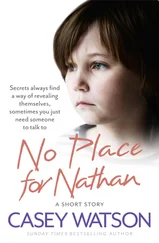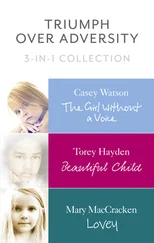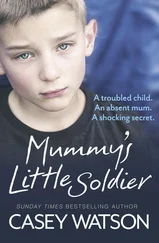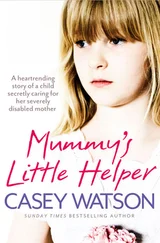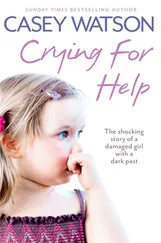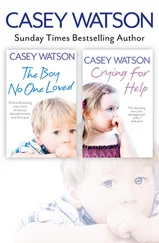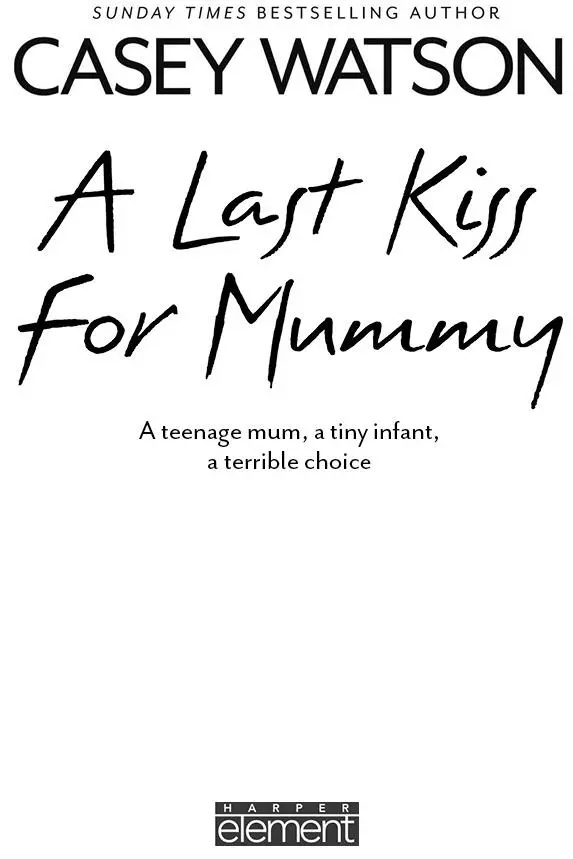
Cover
Title Page
Dedication To my wonderful and supportive family
Acknowledgements Acknowledgements I would like to thank all of the team at HarperCollins, the lovely Andrew Lownie, and my friend and mentor, Lynne.
Chapter 1
Chapter 2
Chapter 3
Chapter 4
Chapter 5
Chapter 6
Chapter 7
Chapter 8
Chapter 9
Chapter 10
Chapter 11
Chapter 12
Chapter 13
Chapter 14
Chapter 15
Chapter 16
Chapter 17
Chapter 18
Chapter 19
Chapter 20
Epilogue
Exclusive sample chapter
Casey Watson
Copyright
About the Publisher
To my wonderful and supportive family
I would like to thank all of the team at HarperCollins, the lovely Andrew Lownie, and my friend and mentor, Lynne.
I’ve known my fostering link worker, John Fulshaw, for something approaching seven years now, so I’ve got to know his face pretty well. I’ve seen his happy face, his sad face, his ‘I don’t know how to tell you what I’m about to tell you’ face, his concerned face, his angry face and his ‘Don’t worry, I’ve got your back’ face as well.
So there wasn’t much that got past me, and today was no exception. There’d been this glint in his eye since the start of our meeting; a glint that told me that today he was wearing his ‘I can’t wait to tell you’ face. He’d had ants in his pants since he’d arrived.
It was a chilly autumn morning at the end of October. Not quite cold enough to put the heating on mid-morning, but certainly cold enough for me to be wearing my standard winter months outfit of leggings, a fluffy jumper and boots. My husband Mike had taken a rare day off from his job as a warehouse manager, and we were all grouped around the dining table, drinking coffee and trying to avoid eating too many biscuits, because it was the day we had our annual review.
It’s something all foster carers have, as a part of what we do – a summing up of how things have gone during the previous year. It’s a time to look back to previous placements, discuss what went well and what didn’t, talk about any complaints and allegations (none for us, thankfully) and, if appropriate, talk about what new things might happen in the coming year. It’s also an opportunity to discuss further training. As specialist foster carers we usually attend at least three training courses per year. In our case, today, everything had been positive, thank goodness. Not every placement works out well – that’s the nature of the job – but we had had a good year and Dawn Foster, the reviewing officer, who was also present, had praised me and Mike for the way we’d handled our last placement: two unrelated nine-year-old boys. Both had certainly been in need of support. Jenson was somewhat wayward, being the child of a neglectful single mother – one who’d left him and his sister home alone while going off on holiday with her boyfriend for a week. Georgie’s problems were different. He was autistic and had come from a children’s home that was closing down; the place where he’d spent almost all of his young life. Individually, both boys came with their own challenges, but our biggest challenge was that we’d had them both together. It had been a rocky ride at times, but, thankfully, they ended up friends.
The review over, and with Dawn on her way back to the office, I closed the front door with a now familiar tingle. We were between placements at the moment and the warm glow I’d felt when Dawn had been singing our praises had now been replaced with a feeling I knew all too well; one of excited anticipation. Just why did John have those ants in his pants? At last I’d have a chance to find out.
When I went back into the dining room – well, dining area, actually; the downstairs of our house is open plan – John was grinning and rubbing his hands together.
‘Well?’ I asked. Mike looked at me quizzically, but John laughed.
‘Get the kettle back on then,’ he said, his eyes glinting mischievously, ‘and I’ll tell you what I’ve been dying to tell you for the last hour.’
By the time I got back, of course, the pair of them were both grinning like idiots, so it was clear Mike was now one step ahead of me. I set the tray down and took my place back at the dining table. ‘Come on then,’ I said, plonking both elbows down. ‘Spit it out.’
Mike laughed, seeing my expression. ‘I think you’d better, John.’
John took his time, picking up his mug and taking a first sip of fresh coffee. ‘Actually, it’s not so much a “tell” as something I want to run by you.’
Which was always ominous. John had a history of wanting to ‘run things by’ us. It invariably meant he wasn’t confident that it was something we’d say yes to – at least wouldn’t say yes to if we had any sense. But that never fazed us. We had never been trained to do mainstream fostering. We were specialists – we specialised in taking the sort of kids that were too damaged or disturbed, for whatever reason, to be suitable for mainstream fostering or adoption.
So what would it be today? I raised my eyebrows enquiringly. ‘So, Casey,’ John said, speaking mostly to me now. It was me, after all, who’d do the day-to-day childcare. We fostered together but Mike obviously had his full-time job as well.
‘Yes,’ I said eagerly.
‘Well, it’s this,’ he said. ‘Have you ever considered a mother and baby placement?’
I caught my breath. No, I hadn’t. It had never even occurred to me. A baby was hardly likely to be damaged at such a tender age, after all. On the other hand, what about the mother? My mind leapt ahead. A baby! I adored babies. Always had. Everyone knew just how besotted I was with my own two grandsons, Levi and Jackson. ‘What do you mean, exactly?’ I thought to ask then. ‘A mother and a baby, or a young pregnant girl?’
John grinned. He could read my expressions just as easily as I could read his. And mine currently had the word ‘baby’ flashing up in neon on my forehead. He knew how fond I was of saying how much I could almost eat my little grandsons, so it was odds on my interest would be piqued.
‘Good point,’ he said. ‘You’ve obviously read the handbook very thoroughly, because you’re right; a mother and baby placement can be either. But in this case, an actual baby. The mum, Emma, is just fourteen and baby Roman is three weeks old.’
‘Oh!’ I cooed. ‘Roman! What a lovely name she’s chosen!’ I turned to Mike. ‘Oh, please, we must. Oh, imagine having a new baby in the house. It would be great.’
‘Slow down, love,’ Mike warned, as I’d already known he would. That was the way it worked with us – I was all enthused and optimistic, whereas Mike was more reticent, always considering potential pitfalls. As systems went, it was a good one, because though more often than not I got my way, it at least meant I rushed into things slightly better informed than I would have been if left to my usual impetuous devices.
He turned to John now. ‘Did she have the baby in care?’ he wanted to know. ‘Or is she just coming into the system?’
‘Good question,’ John said. ‘And you’re right to be cautious, Mike. Emma has been in and out of care for most of her life. Her mother swings between periods of calm and what seems to be pretty “difficult” behaviour. It’s a familiar story, sadly. The mum is alcohol and drug dependent most of the time, and suffers from depression too – cause and effect? – though she does go through periods of drying out now and again. She’s a single parent, and Emma is her only child. When she’s clean she always wants to have Emma back living with her again – which is what Emma usually wants, too – but it’s never too long before the depression takes over again, and then the drinking starts and the poor kid is scooted back into the care of social services quick-smart.’
Читать дальше
